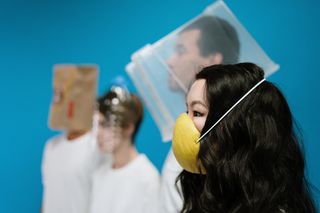Mating
Single, Anxious, and Quarantined
Why video-chat dating works better than you think.
Posted April 27, 2020 Reviewed by Jessica Schrader

You’ve seen the videos about a Brooklyn photographer who used a drone to send his phone number to the woman across the street, wined and dined her by video chat, and finally met her in person while enclosed in an inflated plastic ball. Dating during the coronavirus pandemic can be an extreme sport—but for those of us who live alone, “quarantine” can be just another word for enforced solitude.
Being single, constantly alone, and uncertain as to when the quarantine might end has been uniquely stressful for those people who feel lonely and wish they could meet someone new. If you’re in this position, you may be wondering what you can do about it, and how the rest of the single-and-looking universe is coping with the strange dating hiatus that global events have imposed.
Many people whom you might otherwise be joining for a drink are, as you might imagine, just staying home. In late March, the New York City Department of Health advised that in-person dating poses a risk of transmission for COVID-19, and even went so far as to endorse solitary sex as the safest choice. Dating apps have followed suit; The Technology Review reports that Tinder, for instance, has warned its users not to meet up in public.
Some singletons, who are made uncomfortable by social anxiety during dates, might even be privately relieved that the quarantine provides a good reason to avoid dating; even as they are protecting themselves, they are also declining to confront the social anxiety they feel when they meet new people. And for some others, dating triggers strong discomfort with the way they look; now, faced with the option of presenting themselves on-camera for a Zoom date, they may feel forced to choose between loneliness and powerful anxiety.
But some people haven’t let the quarantine interfere with their dating habits at all. People who started dating before the COVID-19 outbreak but want to keep seeing each other can decide to “quarantine together,” even if they live in different households—by sharing information about their contacts, spending time alone together inside, and seeing no one else. I’ve also met with people who are still planning in-person dates without worrying much about the risk of virus transmission. In cases like these, the opportunity to meet someone new or to experience physical intimacy outweighs the dangers of COVID-19. For others, an elaborate system of vetting becomes necessary, in which it’s perfectly normal to ask one’s dating partner how many other people they’ve been in contact with over the past few weeks, or how often they wash their hands: Personal questions that once might have seemed rude or presumptuous have now become commonplace.
And if a date continues late into the evening, the people involved may find that the coronavirus has changed their interpersonal dynamic. In my practice, I’ve heard several stories of dates that seemed to change, in the course of a night, from a casual fling to something that seemed more like a long-term relationship. In The New York Review of Books, Lucy McKeon indicates that stressful situations like the quarantine can prematurely escalate intimacy in this way.
Despite these dangers, ambiguities, and complexities, dating in person goes on, and those of us who aren’t comfortable coming within 6 feet of someone new (no matter how many times they wash their hands) are finding it necessary to try new tricks. First among them, the many video-chat services like Zoom or Google Video Chat. Loneliness may make this difficult; spending most of one’s time alone, then suddenly switching into “date mode” simply by lifting the screen of one’s laptop, can be a harsh transition. And when you do connect online and are suddenly staring (through your frustratingly off-center camera) at the face of a stranger, lacking even the benefit of direct eye contact, you may have trouble gauging the level of chemistry you feel. “I can’t feel anything over a webcam,” said a patient of mine about dating this way.
Even so, where there’s muck, there’s brass, and some people are discovering that webcam dating is working better than they expected. I personally imagined the coronavirus outbreak would be hard on dating apps, but it turns out the opposite is true: With no other way to get together with the people in your life, it becomes all the more important to find someone to talk to. These strange circumstances, as reported in HuffPost, have even made some people a little bit less fearful of risk-taking by diving into online dating.
Tinder’s CEO would agree; in a recent article in Forbes, she was quoted as saying that the back-and-forth messaging activity among Tinder users has increased by something like 10 to 15 percent over the past few weeks. Ali Wong, in HuffPost, notes that the American cities that have seen the most serious outbreaks of COVID-19 are also those whose citizens are working the hardest to establish online romance: New Yorkers have increased their Bumble message output by 23 percent, while San Franciscans are sending 26 percent more messages.
Perhaps, for these people, dating looks easier and more comfortable now than before the quarantine: You don’t have to leave the safety of your home, it takes less effort to manage how the other party sees you (and how much of your home environment you show off), and you can easily disengage if a date isn’t going well. Plus, it’s possible that some people who would otherwise have sex after only one or two dates are being forced to wait a bit longer, which means they need to connect interpersonally before they act on their sexual attraction.
This might even provide opportunities for serial daters to identify potential partners with whom they have more in common, before initiating a potentially ambiguous sexual relationship. Others will see video chat as a valuable opportunity to weed out suitors who seem phony. In this way, video dating offers a “vibe check” or an opportunity to feel out another person to see if you feel a spark. The Technology Review even suggests that these “vibe checks” may turn out to be so useful that they may continue after COVID-19 has been cured.
If online dating hasn’t worked for you in the past, but you still feel lonely, now may be a very good time to give it another try; for this moment in time, it’s really the best and safest option. One thing most of us have learned from being cooped up at home for the past month is that we’re all in this together—and that reaching out to others to share how we’re feeling, to connect, and to reduce feelings of loneliness can make these long weeks of quarantine easier to bear.
References
Basu, T. (2020, March 26). How coronavirus is transforming online dating and sex. Retrieved from https://www.technologyreview.com/2020/03/26/950282/coronavirus-online-d…
Brown, A. (2020, April 5th) Coronavirus is changing online dating - permanently. Retrieved from https://www.forbes.com/sites/abrambrown/2020/04/05/coronavirus-is-chang…
McKeon, Lucy. (2020, March 25). Pandemic journal. Retrieved from https://www.nybooks.com/daily/2020/03/29/pandemic-journal-march-23-30/#…
Wong, B. (2020, April 1). This Is What Dating Is Like During The Coronavirus Pandemic. Retrieved from https://www.huffpost.com/entry/dating-during-coronavirus_l_5e7b8e01c5b6…




